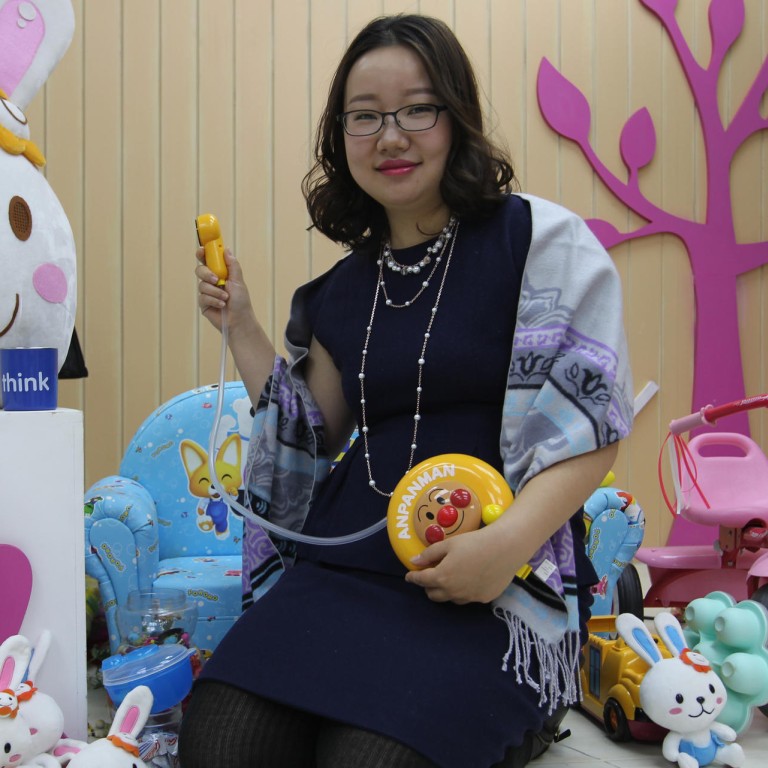
Founder of Chinese online baby goods emporium rides wave of desire for foreign-made products
Liu Nan wanted the best for her child, and built an online empire
Like any new mother, Liu Nan wanted to give the best in the world to her new daughter five years ago. After researching products online, the Beijing housewife selected Japanese diapers, Australian baby formula, British feeding bottles and many more foreign branded products for her little girl.
While sharing her shopping experience with other mothers, Liu found the demand for imported mother and baby products was growing rapidly in the mainland as more parents believed they were better, safer and often cheaper than local goods. But inconvenient delivery services, language barriers, relatively high retail prices and counterfeits still placed barriers for mainland buyers.
"When I started my business four years ago, imported mother and baby goods were only popular among a small number of wealthy families in China," said Liu, 31.
"But this market is changing so fast. Today a lot of big foreign brands have become household names in China's biggest cities. An increasing number of middle-class families now regard imported diapers and infant formula as the only option for their babies.
"It won't take long for us to see the shopping fever for foreign products to expand from big cities to smaller cities or even counties."
On top of consumers' growing taste for superior products, lower prices are a key driver for the demand. More and more cross-border e-commerce players like Mia have bypassed traditional importers and sales agents to source goods directly from abroad.
"By doing this, we can save around 20 per cent of our costs and offer lower prices to our customers, " Liu said.
Behind the promising market is fiercer competition. Mother and baby products are often regarded as the most important category for a shopping site as they are able to attract repeat purchases and generate large sales volume.
The three-day promotion reaped 300 million yuan in sales for Mia, and attracted investors' attention.
In September, Mia announced it had attracted a US$150 million investment from China's online search giant Baidu and other venture capitalists despite a cooling down in the investment market starting in the middle of the year.
Before that, the company already obtained financial support from private equity and venture capitalists including ZhenFund, K2VC, H. Capital and Sequoia Capital China.
In July, Mia also signed direct purchasing agreements with overseas baby formula suppliers Danone, Nestle, Heinz, Wyeth, Mead Johnson and Hero Baby.
"As a newcomer to the e-commerce market, you must take action fast - like throwing a dagger at a target - or you may not survive when others copy your business model," Liu said.
After graduating from the School of Journalism and Communication at Peking University in 2008, Liu got her first job, as a management trainee, with US manufacturer DOW Chemicals.
The company's monthly gross merchandise volume snowballed in the first seven months, rising from 12 million yuan to more than 100 million yuan. This year it is expected to be seven times that of last year, the company said.
As one of China's few women startup entrepreneurs, Liu believes women usually have more patience and better communication skills, but also tend to be more emotional and are easier to be districted by other goals in life.
"There have been a lot of tough moments in my career. When I get emotional, I give myself some time to release my emotion without making any big decisions. When that time is up, I know I need to cheer up and go back to work again."
Last month, Mia started expanding its business from online sales to bricks-and-mortar stores by opening its first shop at a high-end hotel in the tourist city of Sanya , in Hainan .
More stores are planned at other tourist sites and holiday resorts to tap the rising family travel market.
The Chinese leadership's decision last month to loosen its birth control policy to allow all couples to have a second child is expected to provide a boon to the mother and baby goods market.
The government estimates the new policy will result in 17 million more babies born within the next five years.
"We estimate that mainland families in third- to forth-tier cities will be the major beneficiaries of this policy," Liu said. "So we will shift our expansion focus accordingly to these places in future."
